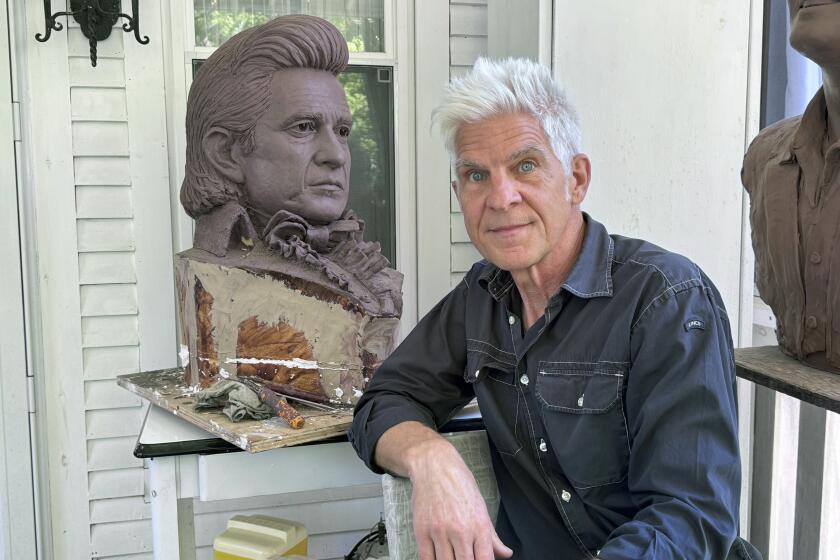NEW DEAL: HANDS DOES A RECOUNT
A widely distributed Ohio newspaper story that received national attention a week ago has spurred Hands Across America officials to hustle up a new breakdown of how $33 million was earned and spent in the aftermath of the May 25 pop charity project.
“I think there’s a lot of misunderstanding on the part of the American public on where our expenses have gone (as a result of the newspaper story),” Hands Across America press spokesman Dave Fulton said Friday. “I think the organization needs to take some of the responsibility on the way we positioned the figures and how we reported it to the media.”
Marty Rogol, executive director of the USA for Africa Foundation, which organized the Hands Across America project, was more blunt.
“The amount of confusion caused by that article is phenomenal,” Rogol said. “I had one person asking if it was true Marty Rogol embezzled money from Hands Across America. One reporter called me from New Jersey asking if we were going to shut down because we couldn’t meet our expenses. It’s unbelievable.”
An article which appeared Aug. 16 in the Cleveland Plain Dealer said that only about half the Hands Across America income would actually be spent on the homeless and hungry--the avowed purpose of the mega-event that drew an estimated 5.5 million participants for a 15-minute hand-holding sing- along over Memorial Day weekend.
But Hands officials said the assumption that 50 cents of each dollar that participants pledged to the project would go to overhead was not true. At present, about 32 cents of each dollar received from the public have been spent on expenses. As some $8 million in outstanding pledges continue to come in, that percentage will drop, officials said.
Expenses for Hands Across America will ultimately total between $16 million and $17 million, as reported by The Times, Associated Press and other news services more than two months ago.
The Plain Dealer’s article recycled the information over the nation’s news wire services and raised anew the question of the high Hands Across America overhead.
The Plain Dealer quoted George Delianedis of the City of Los Angeles Public Social Services Department as saying he would be watching Hands Across America expenses “real closely.” Delianedis is an investigator with the department, which has jurisdiction over licensing of bingo and all charitable solicitations within the city.
Delianedis said the city’s rough rule of thumb for a single charitable event like Hands Across America called for no more than 30% of the gross to be applied to overhead expenses. Professional fund-raisers generally say, however, that it is typical for single event efforts, ranging from benefit shows to testimonial dinners, to cost 50-cents on the dollar.
Delianedis told The Times last week that he is not investigating Hands Across America, has not yet seen the project’s final figures and had no intention of implying wrongdoing on the part of Hands officials.
Rogol said that the public has pledged an additional $8 million over the $33 million that the project has already grossed. If that $8 million is received as expected at USA for Africa’s Century City headquarters in the coming weeks, it should reduce expenses even more. If, and when, all the money has been collected, officials hope that less than 25 cents on each dollar contributed by the public will go to overhead.
Fulton said USA for Africa’s big mistake was reporting in press releases mailed to the media in June that $8 million contributed by Hands Across America corporate sponsors, such as Coca-Cola and Citibank, would be included along with the funding that would eventually be given to the homeless and hungry.
In fact, Rogol told The Times, it was understood months before the event that the $8 million in corporate contributions was to be used to pay salaries, rent, promotional fees, consultants, security, travel and other pre-event expenses. Since the beginning of the year, for example, chief Hands sponsor Coca-Cola was giving USA for Africa $1 million a month to pay for the setup of a network of 16 state offices to oversee the May 25 event.
Fulton said the $8.5 million should not have been included in the $33 million that Hands officials say they have taken in.
“We should have worked from a figure of $24.5 million, which is what the public actually gave,” he said.
Ken Kragen, Hands Across America’s creator and organizer, said that the $8.5 million in additional expenses that came out of that $24.5 million was primarily to pay for insurance and the post-event telemarketing system which was set up to solicit and send out T-shirts, visors and other souvenir premiums bearing the Hands Across America logo.
Kragen told The Times that insurance premiums alone for May 25 totaled $3.5 million. Because only three accidents were reported and no claims have been made against the insurance companies, foundation officials are seeking a rebate of some of those premiums, he said.
The toll-free 800 telephone number plus the costs of premiums, catalogues and other direct-mail operations came to an additional $4 million, Kragen said.
Administrative costs--accountants, attorneys and executive staffing--accounted for another $750,000 in expenses. The remaining $250,000 paid for actually organizing the 5.5 million participants in Hands Across America.
“I think we figured if you divided that (administrative and organizing overhead) by everyone who stood in line, it comes to about 21 cents per person,” Kragen said.
A more detailed line item breakdown of Hands expenses will be completed and made public by mid-September, Rogol said. In the meantime, he said, the remaining $16.5 million that Hands Across America took in after all expenses were paid is currently invested in U.S. Treasury bills and will soon be disbursed to projects that will aid the homeless and hungry.
Rogol said that the Plain Dealer story might have remained strictly an Ohio story if Associated Press had not rewritten a version of it and sent it out on its wires last weekend. Los Angeles all-news radio station KNX-AM (1070) first broadcast the Associated Press version of the story and it was later read over several Los Angeles television stations.
By the end of last week, Rogol and Kragen said they were spending most of their time dealing with fallout from the Plain Dealer story.
More to Read
Start your day right
Sign up for Essential California for news, features and recommendations from the L.A. Times and beyond in your inbox six days a week.
You may occasionally receive promotional content from the Los Angeles Times.






